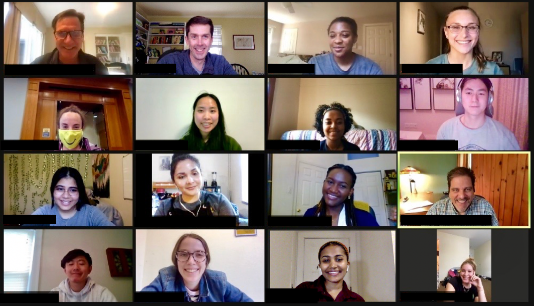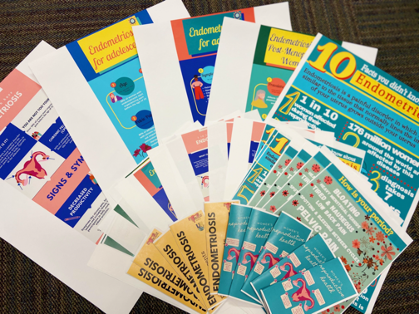Department News
Community Engagement during COVID-19

The Department’s Community Engagement Committee seeks to expand the educational mission of the College outside the borders of our campus to the greater Rochester community. In recent years the Committee has developed a repertoire of diverse activities that that are increasingly mature and sustainable. No longer are outreach activities “one-offs” that faculty, students and staff participate in when their primary duties allow, and which come to us from the outside. We now identify needs and create programs that best serve the community. Most of our programs are collaborative in nature. We have learned that effective engagement depends on our listening and adapting to our stakeholders’ diverse life experiences and agencies. Our efforts are funded at local and national levels, include credit-bearing courses within and outside the College, and extend to urban, suburban and rural communities. We serve folks of all ages in many circumstances, including incarcerated men. While social distancing requirements during the last year felt at times anathema to the spirit and practice of engagement, most of our programs adapted and successfully surmounted the pandemic’s challenges. Without doubt, we look forward to a post-pandemic era!
Below are short descriptions of our main activities during the last year.
Upward Bound: For several summers now, Biology faculty, undergraduate students, graduate students, and staff have contributed to the Kearns Center’s Upward Bound program, which serves mostly minority middle and high school students attending Rochester City Schools. The Upward Bound program provides an unusual amount of support and enrichment to these kids. This summer, Jenn Brisson coordinated six teams, led by Profs. Brisson, Meyers, Fu, Bergstralh, Larracuente and Chen, who provided biology-related activities, mostly through pre-recorded videos that included fun, interactive components on fascinating topics such as fireflies and, believe it or not, the magic of microfluidics.

iGEM: The Department launched its first-ever iGEM (International Genetically Engineered Machines) team in 2020, composed of 12 undergraduate students in a credit-bearing course, coming from both Biology and Biomedical Engineering majors, mentored by Anne Meyer as the head advisor together with Nancy Chen, Alexis Stein, and three teaching assistants. A multi-pronged outreach endeavor, iGEM students taught a 9-module course for the Upward Bound program, taught 4 science lessons for Camp Sonshine elementary-school-age summer camp students in Maryland, and taught 4 science lessons for grade 5 students at a Rochester public school.
iGEM students also ran a public education campaign to raise awareness about the disease endometriosis. The team created a website, infographics, and brochures that provide information about endometriosis. The information was targeted to a number of different groups: adolescents, adults, postmenopausal adults, and healthcare providers, as well as a section including information about general women’s health. This educational material was distributed to the public through the team’s social media platforms, several national and international endometriosis foundations, an article in the Rochester Democrat and Chronicle, an hour-long interview on NPR, a virtual live workshop with a panel of experts organized by the team, and multiple physician's offices and clinics throughout the University of Rochester Medical Center and Strong Memorial Hospital, as well as Virginia, Connecticut, and Puerto Rico.
For their efforts, the 2020 iGEM team was nominated by the iGEM judges for the Best Education award, recognizing our efforts as among the top 5 undergraduate teams in the international 249-team competition. The current 2021 iGEM team is again busy with active education and outreach efforts targeted to a variety of local stakeholders and students.
UR Science stories: In collaboration with the Rochester Education Justice Initiative (REJI), Anusha Naganathan created video content and, with contributions from a number of faculty, taught biology both on-line and in-person to students incarcerated at the Groveland Correctional Institution. These highly motivated and engaging students are seeking associate’s degrees. Anusha won grants from the American Society for Cell Biology (ASCB) and Science sandbox to pay professional videographers to create four terrific short films on the nature of research, featuring department research labs (@URSciencestory). Links to the videos:
Meyer: https://vimeo.com/563758185/1acbaa7e98
Bergstralh: https://vimeo.com/563652152/ac00bf206a
Fu: https://vimeo.com/562944043/b929fc41ec
Uy: https://vimeo.com/563804135/dedc76ae2a
Rochester Science Café: Now entering its 13th year, the Rochester Science Café is a collaboration between David Goldfarb (Biology) and Josh Faber at the Rochester Institute of Technology. These public events serve mostly, but not exclusively, suburban retirees who are eager for continuing education. This season, 7 STEM experts presented on topics such as the SARS-CoV-2 pandemic, particle physics, and even the political science of the 2020 elections. Instead of holding our events in-person at the Pittsford Barnes & Noble book store, the fall and spring seasons were offered by Zoom. This last year we also provided guidance and support for a successful student-organized Science café spin-off at Brighton High School.
Community Engagement Practicum (BIO399): A diversification course in Biology, BIO399 was offered for the fifth time in spring 2021 to 14 biology undergraduates. Directed by David Goldfarb, BIO399 is a collaboration with the Warner School of Education faculty Michael Occhino and Michael Daley. The course trains Biology undergraduates to teach in the Rochester City School District (RCSD). Though the pandemic presented challenges, our undergraduates turned in stellar performances, reporting satisfying personal growth and productive engagements. BIO399 piloted several science-communication exercises that will be trialed in three fall 2021 Biology courses. Providing our students with opportunities to practice explaining basic course-specific biology terms and concepts in nontechnical language should increase their confidence and cement their technical and conceptual understanding of modern biology.
Given the background of the pandemic, our community engagement programs succeeded beyond expectations. A remarkable variety of community groups were served, including many Department members whose lives were enriched by the experience. Institutional support from the College and Department that welcomed the addition of credit-bearing courses to our undergraduate curriculum is especially gratifying. Onward!
